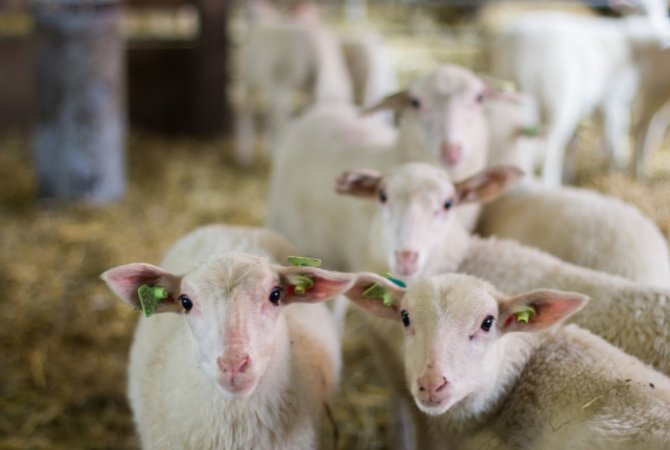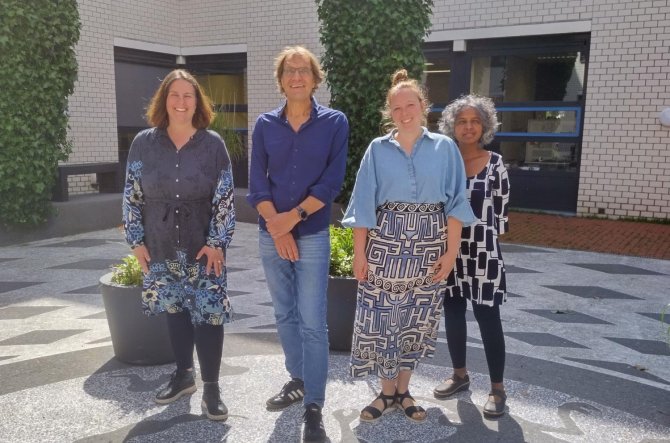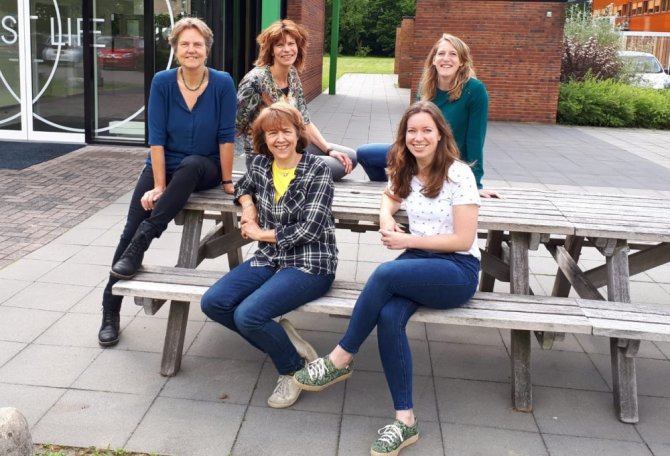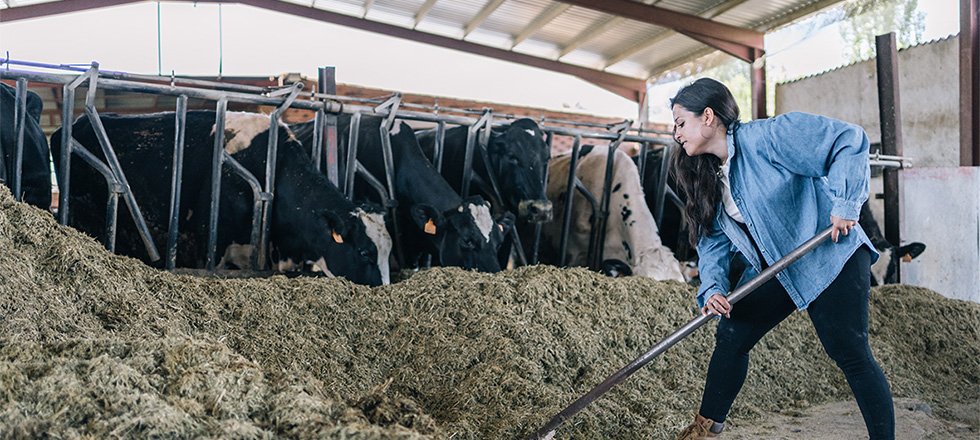About WIAS
The objective of the Graduate School Wageningen Institute of Animal Sciences (WIAS) is to train PhD candidates to become professionally skilled scientists with strong theoretical background.
WIAS aims to reach this goal by offering advanced education, opportunities for reflection on the scientific profession, and by giving PhD candidates the opportunity to communicate their research to the national and international scientific community.
WIAS is engaged in fundamental and applied research and provides training for young researchers in the biology of animals including wildlife, companion animals, livestock and experimental animals.
WIAS is the only graduate school in the Netherlands integrating all disciplines of animal biology, including fundamental and applied research. WIAS was established on 25 May, 1993.
Mission and vision

Our mission is to improve our understanding of animals, their biology and various roles for humankind through fundamental and strategic research and training of early-stage researchers (PhD candidates and postdocs).
Tasks of WIAS
The task of WIAS is to enhance, support and monitor the progress and quality of the PhD candidate education programme and to safeguard and monitor the quality of the research from early-stage researchers in the thirteen chair groups of Wageningen University involved in WIAS.
WIAS aims to provide optimal training and support for early-stage researchers to develop themselves as independent animal scientists at the highest international level.
WIAS research
WIAS research aims to contribute to environmentally sustainable animal production systems, where animal health and welfare are guiding principles. It focuses on the performance of animals in nature and in food production systems and on transforming the latter systems to become more nature inclusive, climate smart, healthy, and circular (terrestrial and aquatic). In order to achieve this, WIAS researchers investigate the biological mechanisms of animals functioning in an evolutionary and ecological context at multiple levels, from molecule to (production) system.
Collaborations
WIAS stimulates collaboration between chair groups and between clusters on key questions requiring interdisciplinary and transdisciplinary approaches. We emphasise the alignment and complementarity between clusters as this is where many new insights and applications are generated by pursuing an integrated approach, with the aim of contributing to the major societal challenges within our domain.
WIAS office

The WIAS office is responsible for the development and implementation of policies and procedures for early-stage researchers (PhD candidates and postdocs).
Read more
The scientific director (Prof. Marc Naguib) and executive staff (WIAS office) are responsible for the execution of the research and education programme.
The WIAS office consists of executive secretary (Dr. Nicole Rodenburg), education coordinator (Dr. Paddy Haripersaud) and management assistant (Lisette Boon-Bourquin).
The WIAS office is supported by the Education and Research committees and the WAPS Council and advises the WIAS Board. The scientific director is selected from the WIAS-associated professors and is appointed for four years. Together with the advisory committee and groups, the WIAS office develops policy and procedures within the framework set by the Board.
WIAS Governance

The WIAS Board is responsible for deciding on the strategy of the research and education programme. The Board is advised by the International Advisory Board and decides on proposals put forward by the WIAS office.
More about WIAS governance
WIAS Board
The WIAS Board is responsible for the strategy of the graduate school. The board makes the framework wherein the scientific director can implement his policy. The WIAS director and executive secretary prepare and attend the meetings.
Board members are appointed for three years and can be reappointed once. The Board consists of 3 (associated) professors of the chair groups associated with WIAS, the chair of the WAPS Council and an external board member.
Current composition:
| prof.dr.ir. F (Frank) van Langevelde | Chair |
| prof.dr. WHM (Wim) van der Poel | Board member |
| dr.ir. JE (Liesbeth) Bolhuis | Board member |
| M (Marwa) Ahmed MSc | Chair WAPS Council |
| Prof. Arjan Stegeman | Utrecht University, external member |
WIAS International Advisory Board
The International Advisory Board (IAB) provides WIAS with advice and recommendations on strategic issues concerning the research and the educational programme of the Graduate School. International experts representing various research areas dealt with within the Graduate School constitute the IAB.
Current composition:
| Prof. Graham Plastow | University of Alberta, Canada; Chair |
| Prof. Gert Flik | Radboud University, the Netherlands |
| Prof. Marion Koopmans | Erasmus MC, the Netherlands |
| Prof. Jan Erik Lindberg | Swedish University of Agricultural Sciences, Sweden |
| Prof. Linda Keeling | Swedish University of Agricultural Sciences, Sweden |
| Prof. Norbert Sachser | Münster University, Germany |
WIAS Associated PhD Students (WAPS)

The WAPS Council strives for a good education programme, contributes to future research plans, and facilitates contacts between WIAS PhD candidates. They monitor and act upon developments that might affect WIAS PhD candidates.
More about WAPS
The WAPS Council holds meetings every six weeks, to which both the board and general members are invited.
Members of the WIAS PhD council
| M (Marwa) Ahmed MSc | Chair of WAPS |
| EN (Erin) Henry MSc | Secretary |
| LLW (Logan) Binch | Member WDC |
| TAM (Tobias) Niehoff MSc | Member Education Committee |
| DL (Dayo) Jansen MSc | Member Education Committee |
| S (Sudip) Debnath | Member Education Committee |
| MP (Mohak) Gujare MSc | General member |
| IN (Ilva Noa) Stellingwerf | Member WDC |
Contact
For information or question regarding the WIAS PhD Council please contact us via: waps.wias@wur.nl.
Read more
Education and Research Committees
The Education and Research committees advise the WIAS office on the PhD training programme and research strategy.
More about the Education and Research Committees
Education Committee (EC)
The EC advises the WIAS office on the PhD training program. The committee evaluates the PhD courses organised by WIAS and provides input and advice concerning PhD training within WIAS. The EC consists of three staff members (representatives of the three WIAS clusters), three PhD candidates and one Postdoc. EC members are appointed for three years and can be reappointed once.
Current composition:
| dr. S (Sylvia) Brugman | Chair, |
| dr.ir. ATM (Ariette) van Knegsel | Staff member |
| dr. R (Ronald) Osinga | Staff member |
| dr. R (Roos) Molenaar | Postdoc representative |
| DL (Dayo) Jansen MSc | PhD representative |
| S (Sudip) Debnath | PhD representative |
Research Committee (RC)
The RC advises the WIAS office on the research strategy and programme. The committee evaluates the PhD project proposals and PhD literature surveys, based on peer review reports. They also advise on the selection of WIAS and WGS grant applications, possible external speakers, strategic research themes and multidisciplinary workshops. The RC consists of five staff members, recruited from the WIAS-associated tenure track personnel and associate professors. RC members are appointed for three years and can be reappointed once.
Current composition:
| dr. RPMA (Richard) Crooijmans | Chair |
| dr.ir. AR (Anouschka) Hof | |
| dr. F (Fotini) Kokou | |
| dr.ir. CE (Corina) van Middelaar | |
| dr. KJ (Katja) Teerds |
More information
Confidential advice
Graduate School confidential PhD advisors
PhD candidates who face problems during their PhD programme can contact the PhD advisor(s) of their own graduate school. The PhD advisor gives confidential advice and coaching on how to tackle the problem or challenge, and when needed may direct the PhD candidate to other advice, support or counselling bodies within or outside the university. When needed and approved by the PhD candidate, the PhD advisor may take action to help the PhD candidate solve the problem.
WIAS confidential PhD advisors:
| dr. N (Nicole) Rodenburg | Executive secretary WIAS |
| dr. PP (Paddy) Haripersaud | Education coordinator WIAS |
WIAS Personal Development Coaches
The Personal Development Coaches give advice to PhD candidates regarding their Training and Supervision Programme (TSP), the personal learning goals, and how to reach these. These coaches are:
| dr. M (Maria) Forlenza PhD | |
| MS (Myrthe) Gilbert PhD MSc | |
| dr.ir. MJM (Martin) Lankheet | |
| dr. YCJ (Yvonne) Wientjes |
Assessment
All publicly funded university research in the Netherlands is evaluated at regular intervals in compliance with a national standard evaluation protocol (SEP), as agreed by the Association of Universities in the Netherlands (VSNU), the Netherlands Organization for Scientific Research (NWO) and the Netherlands Academy of Arts and Sciences (KNAW).
The evaluation process, which is applied at the research unit level, consists of a systematic external peer review conducted every six years, often based on an internal self-reflection, focused on what is achieved since the last external peer review. The last peer review took place in 2021.
